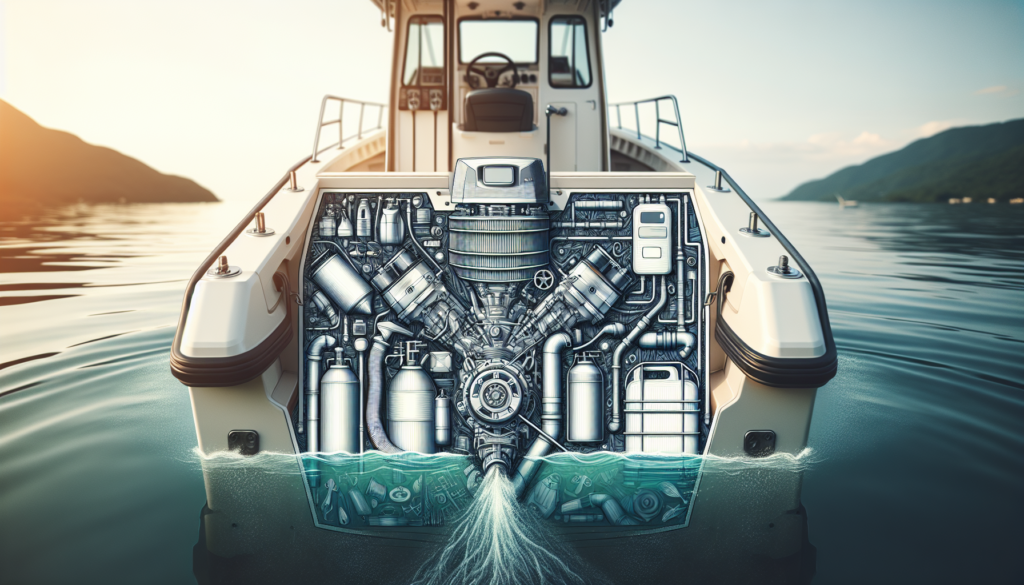Well, friend, you’ve been out savoring the open seas, but have you ever thought about the impact of oil and fuel spills from your boat’s engine on our waterways? In today’s guide, “Top Ways To Prevent Oil And Fuel Spills From Boat Engines,” you’ll get a clear blueprint to safeguard your beloved boat from causing such environmental mishaps. This piece offers valuable, easy-to-implement tips and tricks to enhance your maritime experience and showcase your concern for our oceans. From regular maintenance checks to the proper refueling habits, it’s time you became part of the solution to a cleaner and greener boating lifestyle. Roll up your sleeves and get ready to become more responsible out on the water.

Understanding the Importance of Preventing Oil and Fuel Spills
You’ve probably heard that preventing oil and fuel spills from your boat engines is essential, but do you understand why? Here’s a deep dive to help you appreciate its importance.
Overview about the environmental impact of oil and Fuel spills
Let’s start with the big picture. Oil and fuel spills can cause dire ecological harm. It’s not just about the immediate and visible slick of polluted water around your boat. This goes beyond aesthetics or cleanliness. These spills have severe, long-term consequences for the water and surrounding ecosystems.
Regulations regarding boat pollution and spills
There’s also a legal angle. Regulations are designed to uphold our shared responsibility for maintaining clean water and protecting marine habitats. Failure to comply with these laws can lead to hefty fines, penalties, or even imprisonment. It’s essential to familiarize yourself with these regulations, as ignorance of the law is no defense.
Effects on the marine ecosystem
Finally, let’s not forget the devastation wrought on marine ecosystems by oil and fuel spills. Spilled oil can kill aquatic life directly by physical smothering or through toxicity. It also degrades the overall quality of their environment, leading to population declines and threatening biodiversity.
Ensuring Regular Maintenance of Boat Engines
On to the proactive stuff! Your boat’s engine is a vital but complex piece of machinery. Regular maintenance is crucial in preventing oil and fuel spills.
Importance of maintenance for prevention
Preventive maintenance is all about addressing potential issues before they become real problems. Oil and fuel spills often result from engine malfunctions that regular maintenance could have avoided.
Appropriate timing and scheduling for maintaining engines
Timing is everything. Boat engines are subjected to lots of stress and strain, so they must be serviced regularly. Stick to a maintenance schedule based on the manufacturer’s recommendations and local maritime conditions. Become like clockwork about it.
Check for leaks and wear regularly.
At the same time, always look for any signs of wear and tear or leaks. Nipping these in the bud may be the difference between an enjoyable trip out on the water and a disastrous fuel spill.

Selecting the Appropriate Fuel and Oil
Choosing the right fuel or oil for your boat could prevent potential spills. Not all products are created equal, and what you use can significantly impact.
Choosing high-quality fuel and oil to reduce spill risks
It’s a simple principle: higher quality often means less risk. Invest in high-quality fuel and oil. They tend to be cleaner and more efficient, reducing the risk of spills and engine damage.
Understanding the different types of fuel and oil
Become an informed consumer. There’s a range of fuels and oils, each with different properties and uses. Some are better suited for specific boat engines or conditions, so do the research.
How to properly store and handle fuel and oil
Once you have the right fuel and oil, handle them with care. They need to be stored correctly to avoid leaks. And remember to transfer fuel or oil cautiously to avoid triggering a spill.
Proper Handling of Boat’s Fuel Pipelines
Your boat’s fuel pipelines are another part that needs special attention.
Regular check-up and maintenance
Like your engine, your fuel pipelines need regular check-ups and maintenance to prevent corrosion or blockages that can lead to spills.
Identifying signs of damage
Again, remain vigilant. Leaks, unusual noises, or reduced engine performance could all indicate that your boat’s fuel pipelines are damaged.
Correct installation and replacement procedures
Ensuring fuel pipelines are properly installed and replaced is also crucial. Incorrect installation can create vulnerabilities, leading to spills.

Installation of Drip Trays.
Drip trays are a simple yet effective tool for catching small oil or fuel spills.
Benefits of Drip Trays
Drip trays might not seem like much, but they are a practical way to capture oil or fuel before it enters the water. By collecting these drips, you’re saving yourself clean-up time and preventing pollution.
Choosing suitable drip trays
Choosing a suitable drip tray is just as important. Look for one that fits your engine’s size and shape and can handle the oil or fuel your boat uses.
Proper use and maintenance of drip trays
Once installed, it’s vital to monitor your drip trays regularly. They must be emptied and cleaned correctly to ensure their effectiveness when they get full.
Use of Spill Kits for Emergency Situations
No matter how many precautions you take, it’s wise to be prepared for emergencies with a spill kit onboard.
The necessity of having spill kits onboard
Having a spill kit on board is a simple way to ensure that you are ready to act quickly and effectively in case of a spill.
What makes a good spill kit
A good spill kit should contain absorbent pads or booms, protective gloves, disposal bags, and seals. A set of instructions can also be beneficial in a time of crisis.
Knowing how to use spill kits appropriately
Having a kit is one thing, but knowing how to use it is another. Invest some time to familiarize yourself with the kit and how it should be used to clean up spills quickly and safely.

Good Practices While Refueling
Refueling is another common source of spills, but there are some simple rules to follow.
Appropriate procedures for safe refueling
Follow safe refueling procedures: turn off your engine, don’t smoke, and avoid overfilling your tank or letting fuel enter the water.
Avoiding overfilling the tank
Overfilling your tank could lead to spills, significantly if the fuel expands in the heat. It’s better to aim to fill your tank by about 90%.
Dealing with spills during refueling
In case of a spill during refueling, act immediately! Use your spill kit to mop the spill, notify the marina, and follow local protocol.
Implementing Oil and Fuel Pollution Insurance
Insurance might seem like an extra expense, but it can be a financial lifesaver.
Importance of insurance
Pollution insurance covers you in case of unintentional oil or fuel spills. It can save you from potentially crippling clean-up costs and legal penalties.
Coverage details of different insurance types
Be sure to research various insurance options. Some may cover spill clean-up costs, fines, or damages to third parties. It’s essential to read the fine print and understand exactly what is covered.
Selecting the right insurance option
When selecting insurance, think about the risks specific to your situation. Consider your boat’s age, its fuel capacity, where you moor it, and where you sail. Choose an option that best suits your potential risk areas.
Educating Boat Users About Spill Prevention
Spill prevention doesn’t only rest with boat owners. Everyone onboard should understand their role in preventing spills.
Role of education in preventing spills
Education helps to create awareness and understanding. It can promote proactive actions and develop a culture of spill prevention amongst all boat users.
Resources and strategies for user education
To educate users, tap into available resources. Before setting sail, you could conduct short briefings, provide handouts, or share safety videos.
The importance of continuous learning and updates
With shifting regulations and new developments in spill prevention technologies, learning is a never-ending process. Keep current, and pass on your newly acquired knowledge to others.
Developing an Action Plan for Spill Situations
Ideally, you won’t ever need to deal with a spill, but it’s better to be prepared just in case.
The need for a comprehensive action plan
A step-by-step action plan can be invaluable in a spill situation. It provides clear instructions at a time when stress levels could be high, and prompt action is essential.
Critical elements in a spill response plan
Key elements of a spill response plan include immediate actions to contain the spill, notifications to relevant parties, clean-up arrangements, and waste disposal.
Practicing and testing the plan regularly
Regularly practicing your action plan ensures everyone knows what to do and how to do it. The more familiar people are with the plan, the smoother the response will be.
In conclusion, preventing oil and fuel spills from boat engines requires a comprehensive approach. From selecting quality fuel and oil, proper maintenance of boat engines, and the use of prevention tools like drip trays and spill kits to educating all users and having an action plan ready, each aspect is critical. So, do your part in keeping our waterways clean and safe.

